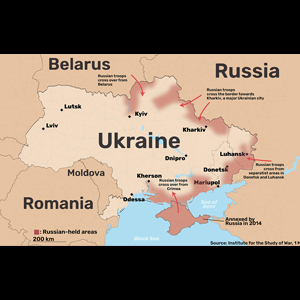IndiaScope: The New Cold War: What’s Next?

A devastating war, started by Russia, has displaced millions of Ukrainian refugees. Russia has lost an unexpectedly large number of soldiers as Ukraine, supported by the West and their allies, put up a heroic fight. For Poland and the Baltic states, this scenario is a nightmare come true and they are reacting ferociously, seeking increasing NATO punitive action against Russia. The Western world has acted quickly to hurt Russia where it is most vulnerable, its economy. Russia has been cut off from large conduits of the world economy, including the SWIFT banking system. Russians all over the world, “Putin’s oligarchs,” have had their assets frozen by the West. The U.S. and U.K. have announced bans on Russian oil, even though this will mean higher prices at the pump and the feeding of an alreadyrampant inflation. In addition, global business chains have exited Russia, leaving the country isolated and shaken. For now, the West is showing its considerable united muscle, although these actions could have longterm consequences that threaten dollar supremacy and strengthen China.
A cornered Russia has warned that any act of arming Ukraine by the West would be translated as an act of war. We were once adept at negotiating the Cold War status quo and averted several nearmisses that could have led to nuclear war, including the Cuban Missile crisis and the 1983 Able Archer exercises incident. We had skilled negotiators on all sides, and a will to prevent the unthinkable. This time around, we seem to have lost the knack (and memory) of de-escalation.
As graduate students of International Relations in the 1990s, we were taught an understanding of world politics through certain tenets. One was to see states as rational actors. No matter how heinous we proclaimed their actions, rational actor theories recognized that states ultimately followed their own interests. Another tenet was to gain an understanding of the enemy’s mindset. The sub-field of Political Psychology underlined the importance of comprehending the leaders involved. Cold Warriors from Kissinger to Brzezinski and agencies engaged in the Cold War like the CIA followed these basic IR tenets. And for all these decades, the world prevented a nuclear war.
Perhaps because we have forgotten how International Relations works, we are surprised by Russia’s actions and Putin’s intransigence in insisting his demands be met even on pain of his own country’s destruction.
The U.S. seems to have lost its role as the world’s most important deescalator of conflict. Channels of communication including media channels, which during the old Cold War were carefully combed for clues, have been closed. The U.S. evinces astonishment that countries like India are not falling into line with condemnations of Russia and cessation of ties. It is forgetting that India has a long Cold War history of non-alignment, where it eschewed taking sides. In reality, it aligned with the former Soviet Union, which it saw as the lesser of two evils, the one who had not been complicit in global imperialism. Indo-Russian ties have remained strong even as India-U.S. ties have blossomed since the 1990s. I wrote not long ago of Putin’s visit to India in December 2021, his warm reception, and the inking of substantial weapons and security agreements.
In India, Russia is still considered a reliable friend, one who has not lectured or pressured India but rather regarded it as an equal. And so far, withstanding great U.S. pressure, India has refrained from condemning Russia’s actions in the U.N. One of the many fallouts from this war, however, is that in the future, the India- Russia relationship will be greatly strained by the evercloser Sino-Russian alliance.
The position of India (and other states in the global South) can be understood as a combination of its non-aligned history and its feeling that while the West often sits on its moral high horse, its own recent actions in Iraq, Afghanistan and elsewhere do not allow it that authority. But the war is far from over, and as things escalate, India may yet issue a condemnation, one in keeping with its own historical traditions and self-interest.

Tinaz Pavri is Professor of Political Science and Director of the Asian Studies Program at Spelman College, Atlanta. A recipient of the Donald Wells Award from the Georgia Political Science Association, she’s the author of the memoir Bombay in the Age of Disco: City, Community, Life.
Enjoyed reading Khabar magazine? Subscribe to Khabar and get a full digital copy of this Indian-American community magazine.
blog comments powered by Disqus














